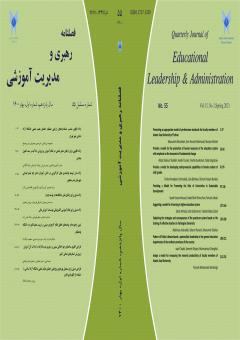تحلیل اثربخشی انگیزش بر احساس مسئولیت اجتماعی معلمان
محورهای موضوعی : آموزش و پرورشمهتاب ولیپور گودرزی 1 , آمنه سپهوند 2 *
1 - دانشجوی کارشناسی ارشد، گروه برنامهریزی درسی، واحد دورود، دانشگاه آزاد اسلامی، دورود، ایران
2 - مدرس گروه علوم تربیتی، واحد دورود، دانشگاه آزاد اسلامی، دورود، ایران
کلید واژه: مسئولیتپذیری اجتماعی, عوامل انگیزشی, معلمان, مدلسازی معادلات ساختاری.,
چکیده مقاله :
هدف: پژوهش حاضر با هدف تحلیل اثربخشی انگیزش بر احساس مسئولیت اجتماعی معلمان انجام شد.
روش: روش پژوهش حاضر توصیفی از نوع همبستگی و از نظر هدف کاربردی بود. جامعه آماری پژوهش شامل ۲۰۰ معلم از شهر اشترینان بوده که با استفاده از جدول مورگان، ۱۲۷ نفر به عنوان نمونه ازطریق روش نمونهگیری تصادفی ساده انتخاب شدند. ابزار جمعآوری دادهها شامل پرسشنامه مسئولیتپذیری اجتماعی کارول (1992) با پایایی 70/0 و پرسشنامه انگیزش شغلی هرزبرگ بود که این پرسشنامه نیز توسط دارچینی در سال 1394 نیز بیش از 70/ ارزیابی شده است. دادهها با استفاده از نرمافزار SPSS نسخه ۲۶ و PLS با روشهای آماری توصیفی و استنباطی شامل مدلسازی معادلات ساختاری مورد تحلیل قرار گرفتند.
یافتهها: نتایج نشان میدهد که عوامل انگیزشی رابطه مثبت و معنیداری با مسئولیتپذیری اجتماعی معلمان دارند. عوامل انگیزشی درونی بر تقویت مسئولیت پذیری معلمان شهر اشترینان مؤثر است. نتایج تخمین مدل با روش PLS نشان داد سطح معنيداري بين عوامل انگیزشی بیرونی بر تقویت مسئولیت پذیری برابر 000/0 با آماره تي(عدد معني داري) 757/4 ميباشد. سطح معني داري از 0.05 كوچكتر و آماره تي از 1.96 بزرگتر ميباشد. بنابراین عوامل انگیزشی بیرونی بر تقویت مسئولیت پذیری معلمان شهر اشترینان مؤثر است.
نتیجهگیری: این یافتهها میتوانند به مدیران آموزش و پرورش و مدیران ارشد وزارت خانه در تدوین برنامههای انگیزشی و بهبود مسئولیتپذیری اجتماعی معلمان کمک کنند و همچنین به معلمان در درک اهمیت این مسئولیتها کمک نمایند.
purpose: The present study was conducted with the aim of analyzing the effectiveness of motivation on teachers' sense of social responsibility.
Methods: The statistical population of the research included 200 teachers from Ashtrinan city, and using Morgan's table, 127 people were selected as samples using simple random sampling method. It was done with practical purpose. The descriptive research method was of the correlation type, the data collection tool included Carroll's social responsibility questionnaire (1992) with a reliability of 70% and Herzberg's job motivation questionnaire, which was also evaluated by Darchini in 2014 as more than 70%. The data were analyzed using SPSS version 26 and PLS software with descriptive statistical methods (central indices, mean, median, mean and dispersion indices; standard deviation and variance) and inferential methods including structural equation modeling.
Findings: The results show that motivational factors have a positive and significant relationship with teachers' social responsibility. Internal motivational factors are effective in strengthening the responsibility of teachers in Ashtrinan city. The results of model estimation with PLS method showed that the significance level between external motivational factors on strengthening responsibility is equal to 0.000 with a t-statistic (significant number) of 4.757. The significance level is less than 0.05 and the t-statistic is greater than 1.96. Therefore, external motivational factors are effective in strengthening the responsibility of teachers in Ashtrinan city.
Conclusion: These findings can help education managers in developing motivational programs and improving teachers' social responsibility, and also help teachers understand the importance of these responsibilities.

